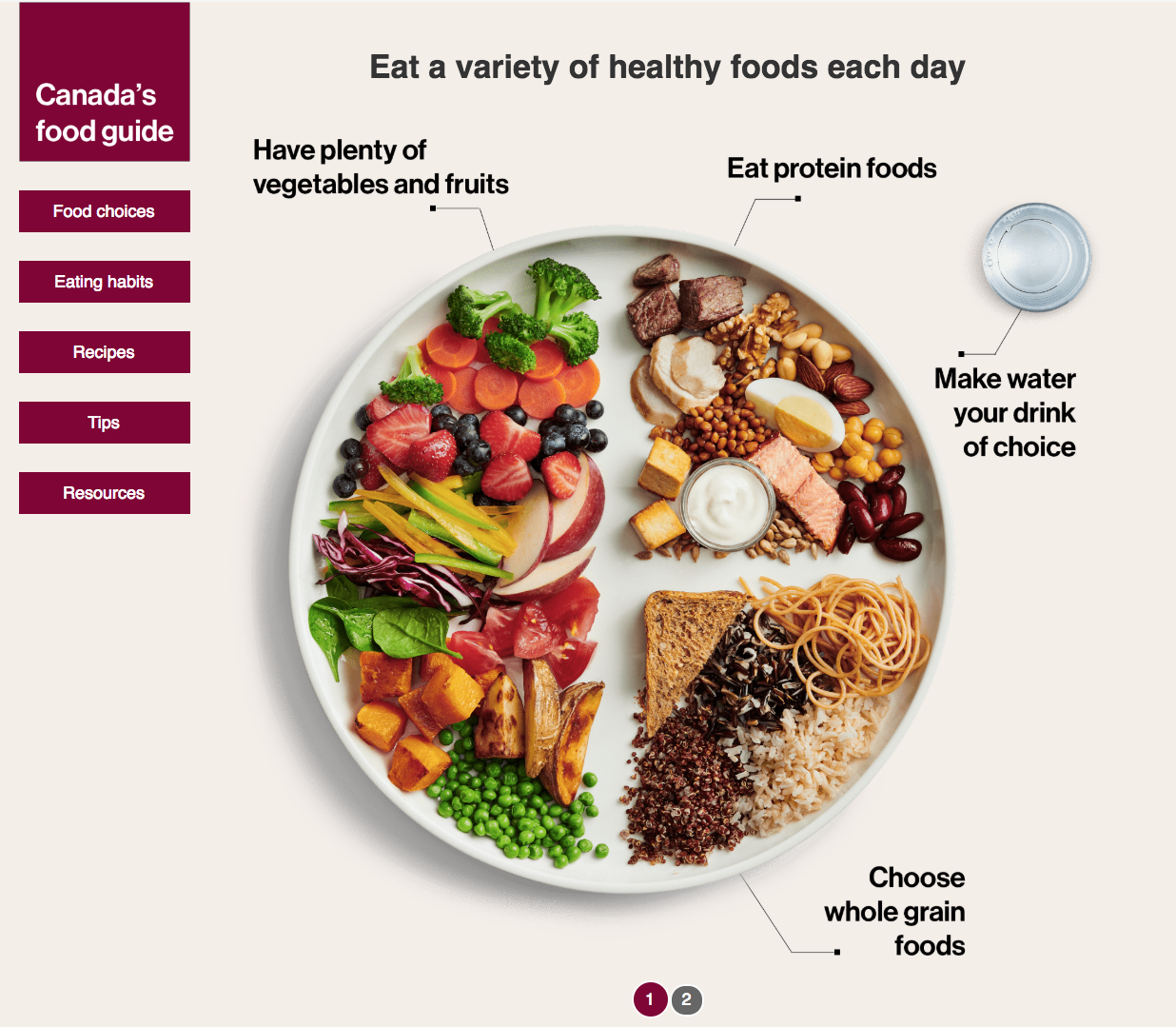Canada’s Food Guide is an eating plan created by Health Canada to help Canadians make healthy food choices. The guidelines were updated in early 2019 and are available in a variety of different languages.
The importance of healthy eating
Here are the types of foods that should make up a meal.


How to eat healthy
Eat a variety of healthy foods each day.
Eat plenty of vegetables and fruits, whole grain foods and protein foods. Choose protein foods that come from plants more often.
-
Vegetables and fruits have important nutrients. Include them in your meals and snacks. Try making half of your plate vegetables and fruits. Choose different textures, colours and shapes to suit your taste.
-
Whole grain foods are a healthier choice than refined grains because whole grain foods include all parts of the grain. Enjoy a variety of whole grain foods such as whole grain pasta, whole grain bread, brown rice, wild rice or quinoa.
-
Choose protein foods that come from plants more often. Plant-based protein foods can provide more fibre and less saturated fat than other types of protein foods. Try to eat protein foods such as beans, peas, lentils, nuts, seeds and tofu as well as lean meats and poultry, eggs and fish.
Limit highly processed foods. If you choose these foods, eat them less often and in small amounts.
-
Choose less processed foods. Have leftover baked chicken instead of deli meats or steel-cut oats instead of sweetened instant oats.
-
Stock your kitchen with healthy snacks. Try quick and easy options like nuts, fruit, carrots and hard-boiled eggs.
-
Make homemade versions: Try a healthy muffin recipe to replace store-bought muffins or make your own frozen dinners by choosing a healthy recipe and freezing it in meal-sized portions.
Make water your drink of choice.
- Replace sugary drinks with water.
Use food labels.
Be aware that food marketing can influence your choices.
How can a dietitian help you use the information in Canada’s Food Guide?
A dietitian can help you take the messages in the food guide to help you make food choices that meet your preferences and health goals. For example, they can show you how to add more plant based foods to your meals and how to cook whole grains. Some dietitians will walk you through the grocery store to show you how to read food labels or compare products.
A dietitian can work with you to make food choices to manage conditions like diabetes, heart disease and digestive issues. The advice and information dietitians provide is tailored to your personal needs and challenges, including taste, food skills and accessibility. Here’s how to find a dietitian in your area.
Focus on food behaviours
Healthy eating is more than the foods you eat. It is also where, when, why and how you eat.
Be mindful of your eating habits
Cook more often
Enjoy your food
- Cultural foods and food traditions are a part of healthy eating. Festivals and special occasions should be celebrated and enjoyed with food.
Eat meals with others
- Enjoy quality time together and share food traditions.
Bottom Line
The new Canada’s Food Guide describes the food choices that make up a healthy eating pattern and encourages positive eating behaviours. Visit the Food Guide website to find more information on meal planning, grocery shopping, cooking, recipes, food safety and more.
A dietitian can help you take the ideas in the Food Guide to make healthy choices based on your food preferences and health goals. Dietitians work everywhere. Here are some ways that you can find a dietitian near you.
You may also be interested in:
Understanding Food Labels in Canada
Last Update – January 14, 2022